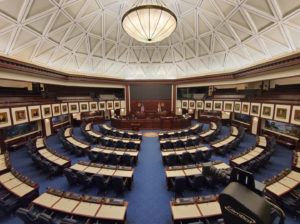A majority of Americans seem to agree on what should not be taught to the youngest public school children
A recent poll reveals some common ground amid vast differences in how American parents view what’s appropriate when it comes to sex, race and gender education in the classroom.
But some states…

A recent poll reveals some common ground amid vast differences in how American parents view what’s appropriate when it comes to sex, race and gender education in the classroom.
But some states have yet to address their concerns.
The findings follow Florida Gov. Ron DeSantis’ signing of the “Parental Rights in Education Bill,” which says a “school district may not encourage classroom discussion about sexual orientation or gender identity in primary grade levels,” and only in an age-appropriate manner in subsequent grades.
Reaction to the legislation has been explosive at times, not to mention misinformed, but a recent poll shows many Americans across the political spectrum share the governor’s concerns.
In the Golden/TIPP Poll, Americans were nearly twice as likely to support the Florida law than to oppose it. A total of 57% of Americans agreed with the legislation, while only 31% disagreed.
“Interestingly, a majority, irrespective of party affiliations and ideologies, backed the bill, except for liberals,” the pollsters said. A majority of Republicans (73%), Democrats (51%) and independents (54%) supported the bill.
Those who described themselves as “liberals” were split, with 42% backing the new law and 53% opposing it.
Curriculum concerns addressed by the Florida law also are making news in other states, such as New Mexico and New Jersey.
In March, New Mexico’s department of education approved new education standards that include ethnic and social identity lessons for students, including kindergartners. The guidelines have received backlash from critics concerned with the appropriateness of the material for each grade.
For example, the new standards require kindergarteners to learn about “identity groups” and be able to “identify some of their group identities.” Third graders will learn about “community equity building.” And highschoolers will “examine the experiences, activism, and legislation impacting the LGBTQIA+ communities.”
The revised standards originally included other controversial topics that the education department removed after considering public comments against them. The troubling topics included “mentions of sexuality, communism, police brutality and gun violence,” according to a statement from Maddy Hayden, Gov. Michelle Lujan Grisham’s spokesperson.
State House Republican Whip Rep. Rod Montoya has responded to the new standards with an open letter to New Mexico’s local school board members and school superintendents, encouraging them to reject them. He also criticized the state for overreaching.
“These new K-12 social studies standards are just the beginning of an effort to diminish the authority of parents, school boards, and superintendents in determining what education is best for their kids,” Montoya warns in his letter. “If the New Mexico Public Education Department is successful in forcing these new standards into our schools, local control of education in our state will never be possible again.”
In New Jersey, current state educational standards have come under fire after local school boards began to share sample resources with their districts. Parents raised concerns about the sexual orientation, gender identity and anatomy lesson outlines in particular.
Several Republican state senators signed a letter asking Democrat Gov. Phil Murphy to wait to implement the guidelines until lawmakers have been able to hold public hearings on them.
Gov. Murphy has directed the state department of education to “review the standards.”
Florida, New Mexico and New Jersey are just three examples of how states – and parents – are grappling with sex, race and gender education in America’s public schools.



